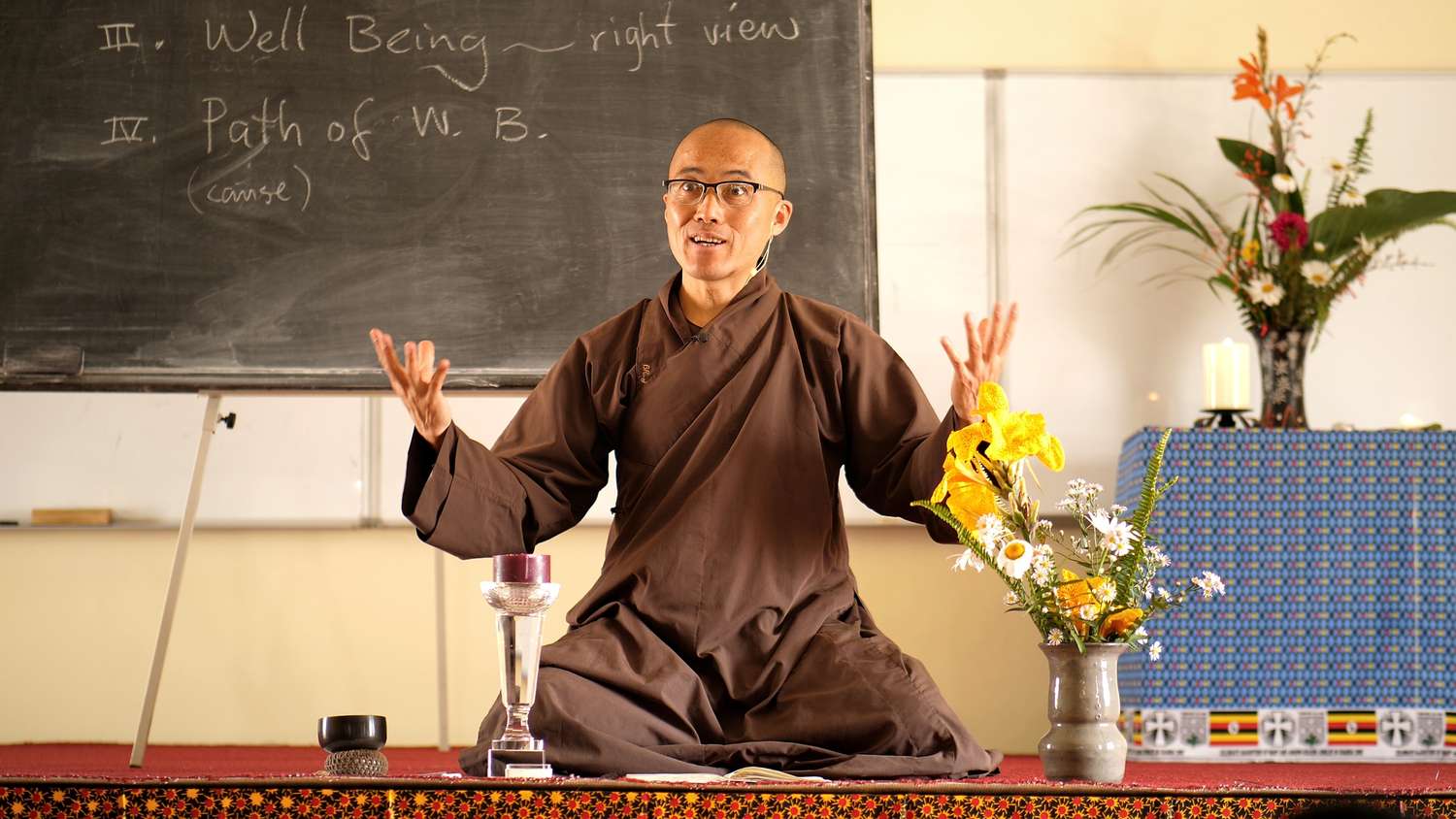Thay’s Vision for Wake Up Schools
Brother Chân Pháp Lưu & Orlaith O’Sullivan
Br. Phap Luu has been involved in Wake Up Schools since its inception in 2012.
Orlaith (also known as "Orla") is a member of the Order of Interbeing and the International Coordinator of Wake Up Schools. She has founded two sanghas in Dublin, one for adults and one for families, and teaches how to build happier communities.
Thay, one of the first monks to include elements of Western science and philosophy in the monastic curriculum, has always been curious about how we learn and how we can live together.
Roots in Vietnam at war
In the ‘60s during the American War in Vietnam, Thay, along with Sister Chan Khong, created the School of Youth and Social Service to train young volunteer teachers to go into the countryside to work with the children of farmers, while their parents were out in the rice fields. These volunteers would go into the villages without any money and just play with the children at first. Eventually they would start teaching them simple lessons and offer the children a cup of soy milk each for lunch. Over time they gained the trust of the villagers; eventually one of the villagers might even offer their house during the day as a schoolhouse. The trust grew as the people saw that the volunteers weren’t trying to impose any ideology on them, or convince them to be on one side of the war or the other. They were just coming to help. At that point, the people in the town would often pool their resources to build a simple school.
This movement, begun during the wartime, continues today in Vietnam with the Love and Understanding Humanitarian Relief Program. Sr. Chan Khong and her many helpers, along with the Thich Nhat Hanh Foundation, support teachers working in very remote areas of Vietnam where they don’t yet have a school. Usually, after a few years, once the basic educational system is established, the government follows by coming in and building proper schools. So Thay has been training teachers since he was a young monk and Dharma teacher. This work makes up the deep roots of Wake Up Schools.
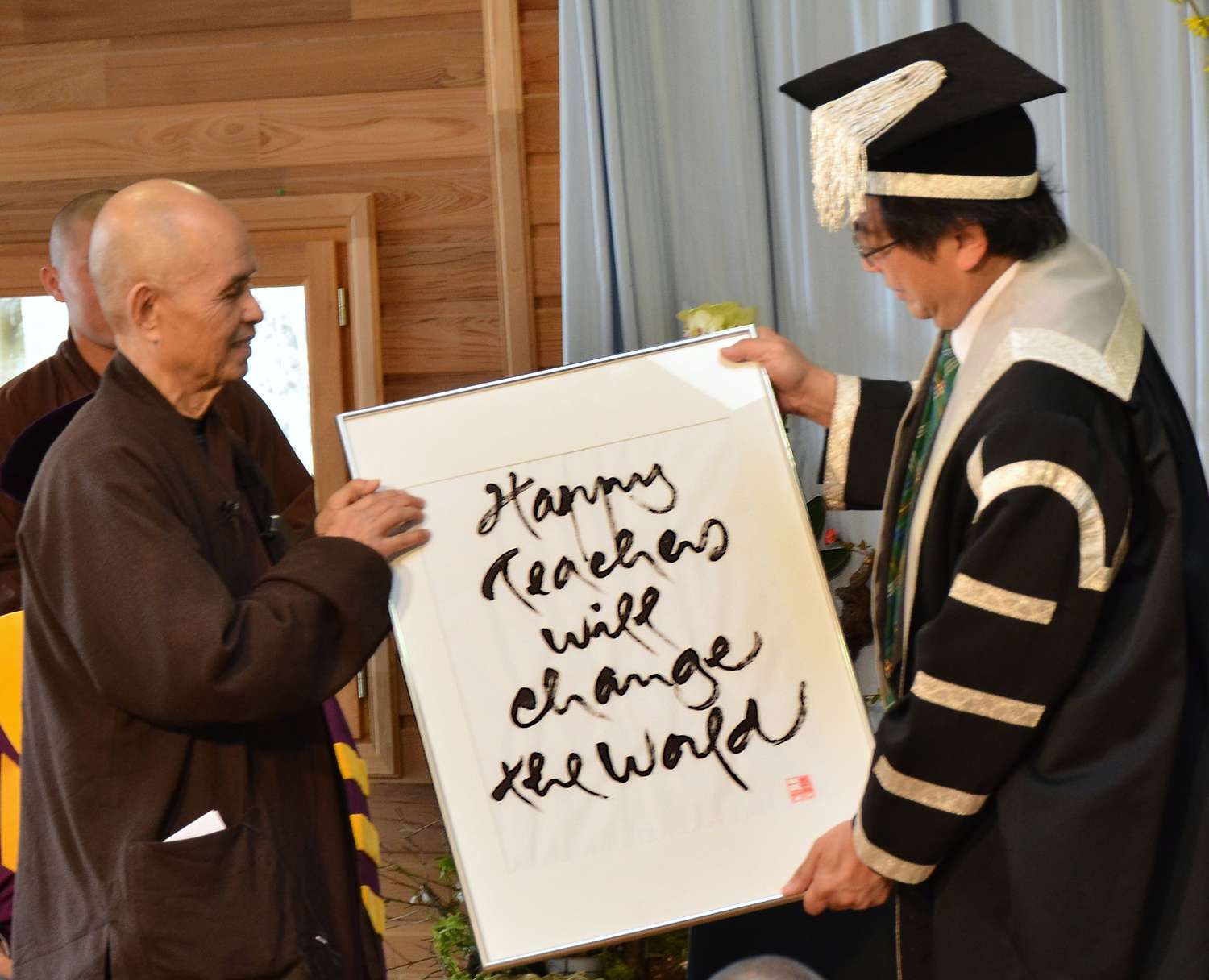
Coming to the West
After Thay was granted political asylum in the West, he and Sr. Chan Khong began to build a community here in France–first in and near Paris, and eventually, in 1982, in what became Plum Village in the Dordogne. In its earliest days, Plum Village was a place for education–not only for mindfulness but also for the transmission of Vietnamese culture and values to overseas Vietnamese and their children. In the ’90s, after the monastic community started to grow in Plum Village, Thay made efforts to bring these experiments in education out to the wider public. Thay inspired teachers to bring mindfulness practice into their classrooms–especially Richard Brady, a North American maths teacher in a Quaker School near Washington, D.C. and now a senior Dharma teacher in our tradition.
Richard seeded an educational network called the Mindfulness in Education Network (mindfuled.org), which continues today to connect teachers online, and to organize a gathering of teachers once each year. Through this, a movement of mindfulness in education began to build.
In 2008, as Thay prepared for a tour in India, senior Dharma teacher Shantum Seth, the main organizer of the tour, asked Thay what would be the main theme of the tour. Thay told him he wanted to focus on education: How can we help our teachers and their students to take care of their emotions–especially difficult emotions? That is what has been missing in the modern educational system. Thay had the insight that mindful breathing could help, so Shantum organized a nationwide retreat for teachers in India, where Thay taught about mindfulness in the classroom.
At the time, in France, the President was calling for schools to institute a class in ethics, but there was a lot of debate about what would be taught in that ethics class. Thay said that he had an idea: that when the children learn to breathe mindfully, stop, and come back to their body to see what is going on inside of them, they would get in touch with the good qualities that they have inside themselves and learn how to cultivate them. They also have an opportunity to look inside to see how their anger, sadness, and fear are nourished by their way of thinking. Just by looking deeply, we can actually live a more ethical life. Thay called this Applied Ethics, which became the basis–the ethical foundation–for what we now call Wake Up Schools.
Developing training for teachers
Then we started doing more and more retreats for educators in Asia, Europe, and North America. We had done a number of short programs in schools in England, America, India, Indonesia, and all around the world, but we learned that what actually sticks and has a greater impact is the personal transformation that a teacher can experience on a five, six or seven-day retreat. After a number of these retreats, teachers asked us for something they could take home with them to continue to practice and deepen what they had learned, so we started thinking about how to develop training materials.
Br. Phap Dung, Sr. Chau Nghiem, Br. Phap Lai, Br. Phap Luu, Br. Phap Linh, along with other monastics, worked with Professor Katherine Weare, Elli Weisbaum, Yvonne Mazurek, and others to develop, over a few years, a manual for professional teachers that would cover the basic Plum Village practices. This became the book Happy Teachers Change the World: A Guide for Cultivating Mindfulness in Education, which is now the textbook training manual for Wake Up Schools. It includes the personal experiences of hundreds of teachers who have applied Plum Village practices in their classrooms and daily lives. The book is not just theory but the fruit of applied practice.
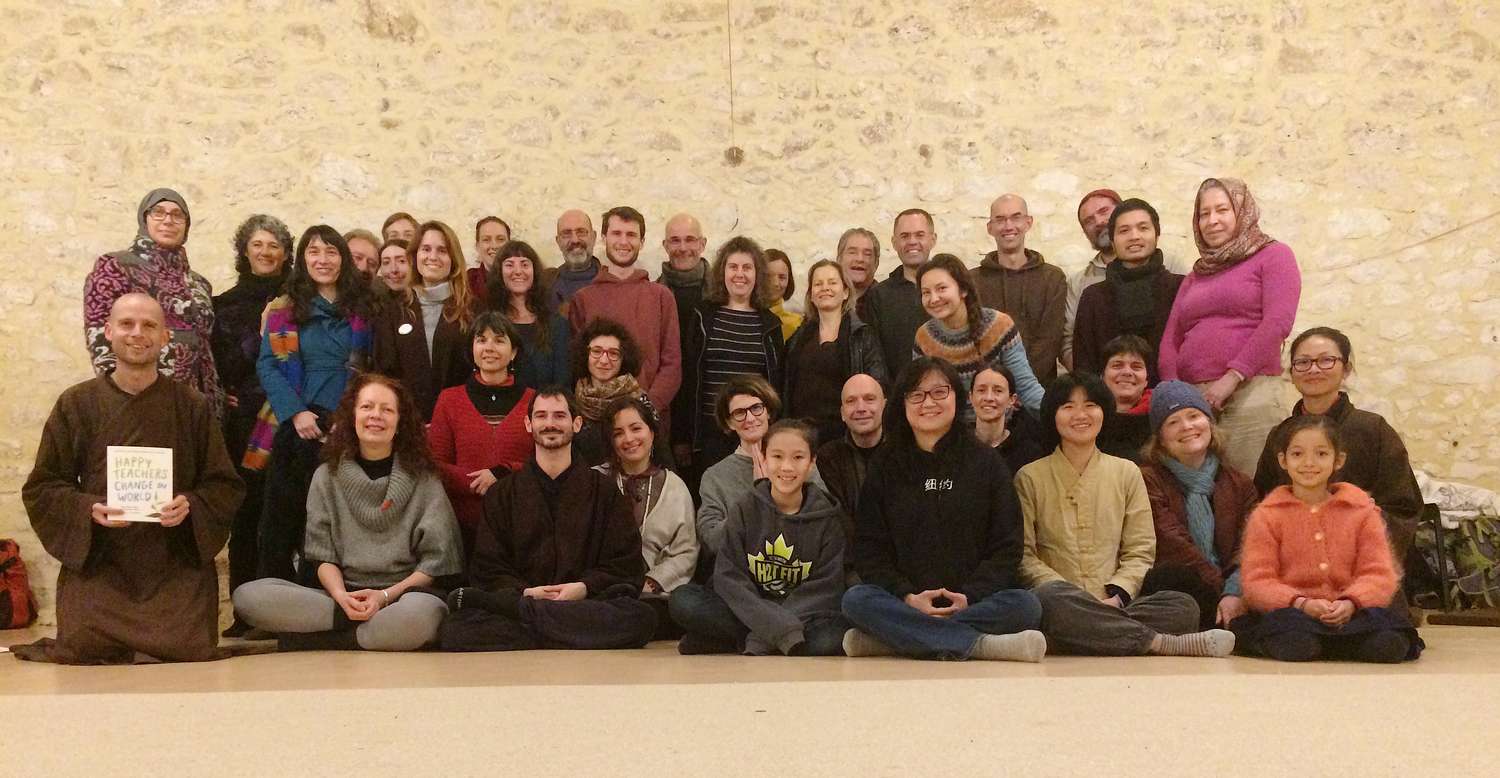
Beyond offering retreats for teachers, we developed a one-year training program–modeled on the training program for core members of the Order of Interbeing–that we call the Happy Teachers Training Program. Over the past six years, teachers in North America, as well as France, Italy, Germany, and Spain, have gone through this program. The teachers began by undergoing a one-year mentorship with an established Plum Village Dharma teacher and teachers who have already completed the program (“Happy Teachers”), under the auspices of Plum Village and run by the Order of Interbeing in each country. Nowadays, as the program has grown and because we want it to be community-based, this mentorship program has evolved so that each group of trainees forms their own educators’ sangha. See https://wakeupschools.org/what-we-offer/training/.
By a “happy teacher” Thay means you. Being a “happy teacher” doesn’t mean you’re happy all the time; it means you know how to take care of yourself in order to generate happiness. Thay would draw a circle with an arrow pointing inwards and tell us, “The way out is in.” If we are first able to take care of ourselves as a teacher, then we learn how to take care of our family, our colleagues and also our students, and then the parents of the students and so on. In this way the circle expands outward.
If the first person doesn’t know how to take care of themselves, then they cannot help other people to take care of themselves. That’s why in Wake Up Schools we always say that the practice starts with ourselves–the teachers. You have to transform yourself first.
The Three Pillars of Wake Up Schools
The first pillar of Wake Up Schools is embodiment: we need to embody the practice as teachers. We begin by helping the teachers to touch freedom, joy and happiness in a retreat. When a teacher touches that freedom, and transforms themselves, their interest deepens. Quite naturally, they will want to share their experience with others. Their colleagues and family ask, “How is it that you seem so much lighter, that you look so much happier? What did you do?”
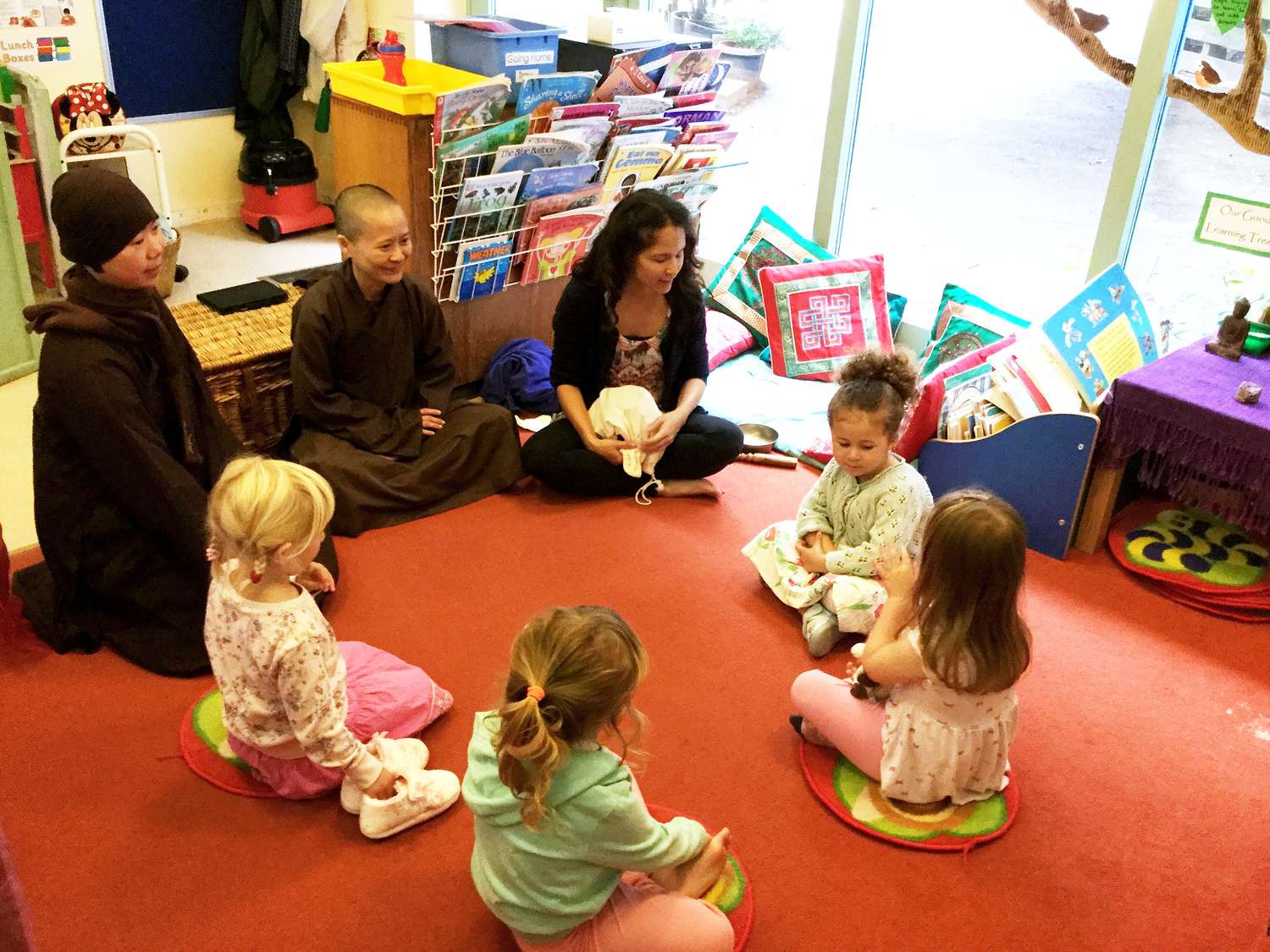
This touches on the second pillar of Wake Up Schools: service. Service means that we’re in this to change the world, not to just make a living for ourselves, to make a profit or a business out of mindfulness. The teaching is something that we offer freely, and that spirit infuses everything about Wake Up Schools. Our direction is to transform the whole school community. Starting with ourselves, we expand our circle of influence to our family, our colleagues, our students, and administration. By transforming the school, we arrive at transformation at the level of society.
This creates a precious opportunity to build community, the third pillar of Wake Up Schools. This is something that we do well; centers in the Plum Village tradition around the world make up living, breathing communities. For us mindfulness is a path, not a tool. We are here not just to transmit a technique. It’s a path–a whole way of living–that we walk together and not alone. Our international community is made up of people from many different backgrounds and cultures–European, North American, Asian–all living together year round, practicing sitting meditation, walking meditation, and eating meditation together. Community is built into our DNA. So expanding that into schools–including teachers, their families, and their students is quite natural.
Current initiatives
When we practice, we also do it as a community. The Happy Teachers SanghaSee https://wakeupschools.org/happy-teachers-sangha/.–which includes members from Japan, Russia, France, Germany, North America, the Philippines, the Netherlands, Kenya, and Brazil–is a concrete manifestation of this. Teachers come together online to share their happiness and suffering with each other, so that they can deepen their understanding and support one another. We currently have one global Happy Teachers Sangha and one specifically for North America.
Being a mindful teacher today is to be an activist, transforming society at the root. To support this we held an International Wake Up Schools Retreat and Gathering Online, from Friday 25 to Sunday 27 February 2022. This was an opportunity for teachers to connect with each other, refresh their personal practice, and work together to develop curricula for students–a weekend to pause and reflect on what it means to be a mindful teacher amidst our colleagues and administrators. As our monastic practice centers reopen post-pandemic, we continue to provide a thriving community for teachers to come back to, a refuge, when they feel fatigued or burnt out. They know they can always come back here and the community continues to be a place of practice.
Recently the work of Wake Up Schools was featured in a new evidence-based guide published by The Mindfulness Initiative. Implementing Mindfulness in Schools: An Evidence-Based GuideSee https://wakeupschools.org/wake-up-schools-featured-in-new-evidence-based-guide/. is a comprehensive guide written by Professor Katherine Weare and Adrian Bethune after extensive consultation with an expert steering group, including our International Co-ordinator, Dr. Orlaith O’Sullivan. The guide highlights the importance of whole-school engagement and of adopting a long-term approach to infusing the school with mindfulness.
Blossoms of the Wake Up Schools network
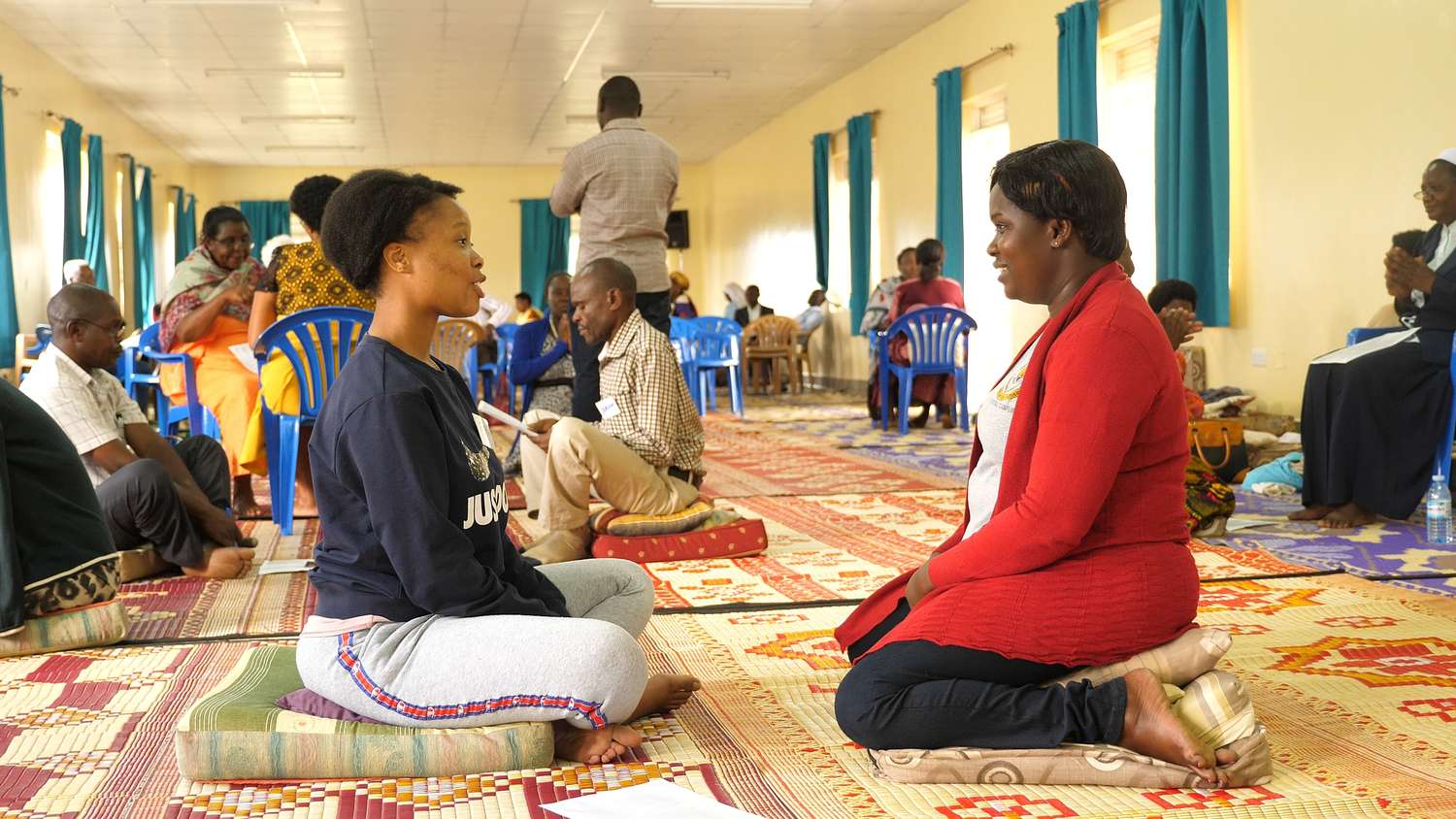
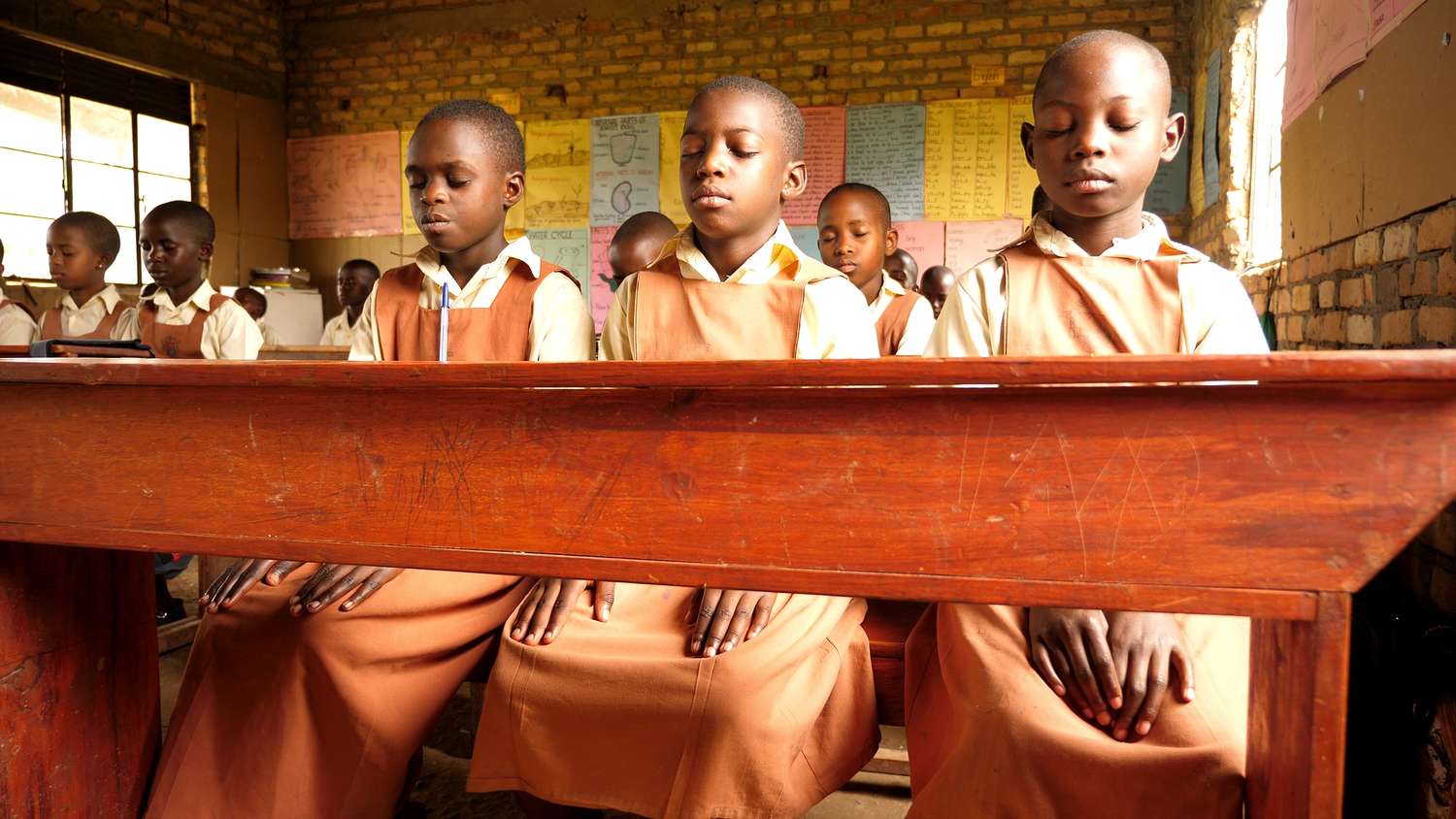
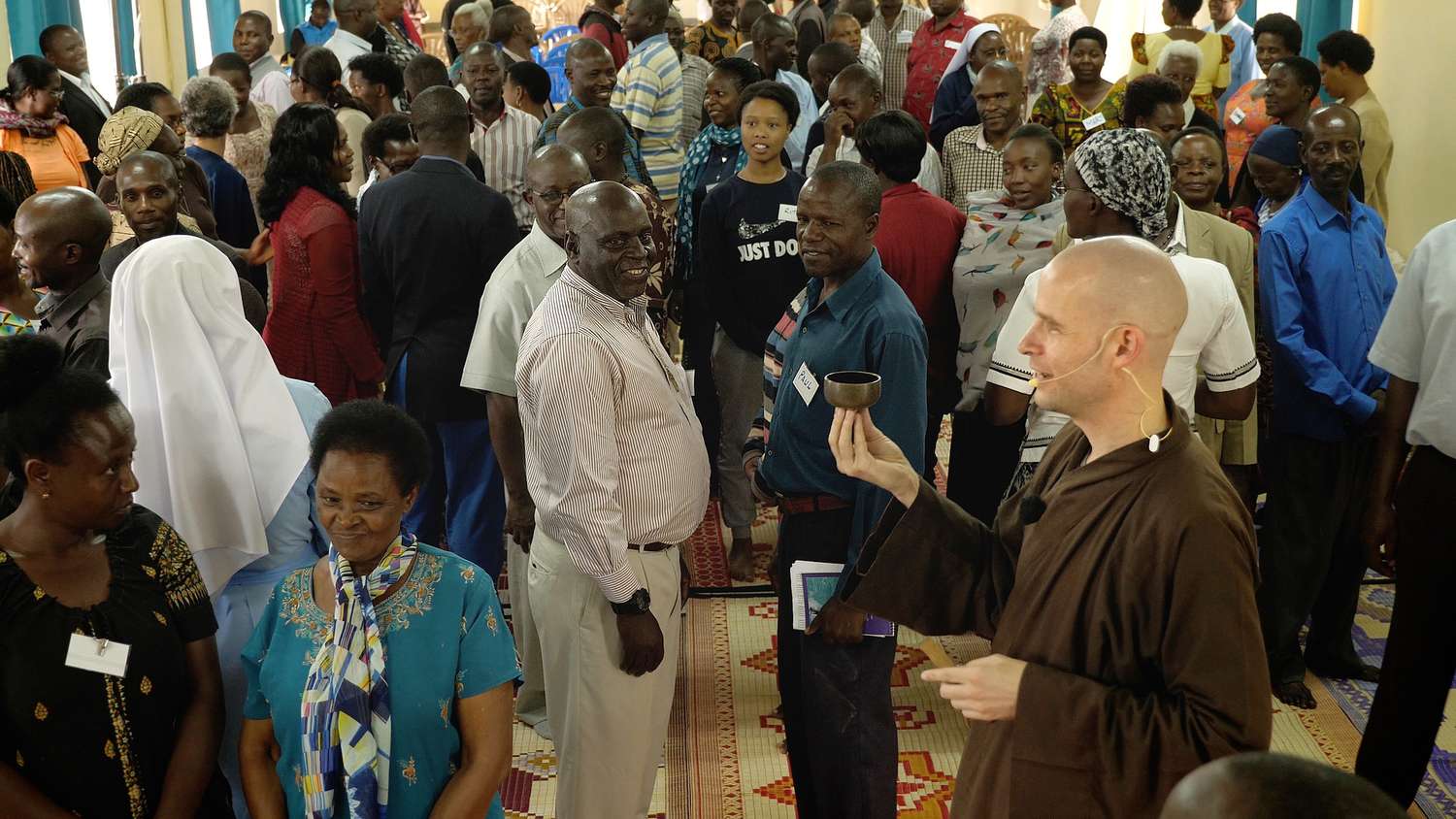
In January of 2019, Br. Phap Dung, Sr. Hien Hạnh, Sr. Thanh Nghiem, Br. Phap Luu, Sr. Thao Nghiem, Br. Bao Tang, and Br. Pham Hanh brought Wake Up Schools to Uganda. Most of the 250 or so teachers were Catholic–they even held a Catholic mass every day during the retreat. This was a new environment for us because we’re used to teaching in the more secular parts of the West. But there was really no obstacle. We went there to teach mindfulness, how to understand your mind: how do you get to know difficult emotions directly and understand what kind of nutriment gives rise to them. People there got that everyone needs this–it’s a kind of teaching that every human being really needs to live happy and healthy lives. Now the teachers are bringing their experience of deep transformation back to their schools and sharing it as more compassionate teachers with their colleagues and students. This trip was filmed by Wouter Verhoeven of Evermind Media and is being made into a documentary.See https://evermind.media/happy-teachers-change-africa.
During the pandemic, Wake Up Schools offered webinars to support healthcare workers in Vietnam, including a workshop hosted with the Center for Healthcare Improvement Research and the Oxford University Clinical Research Unit (OUCRU).
Staff from the Hospital of Tropical Disease (Bệnh viện Bệnh nhiệt đới Trung ương) in Hanoi and Chợ Rẫy Hospital in Ho Chi Minh City–two hospitals that have been at the front line in Vietnam’s effort to contain and to treat COVID-19–participated. The webinar is now available for their healthcare staff of 30,000 people.
We also offered two webinars in Vietnam to support teachers and parents as schools reopened. On Sunday May 3, 2020, as schools were about to reopen, we supported an online seminar for educators and parents called “2020 Noble Semester–Học kỳ cao quý,”See https://youtu.be/WVHVwZa4wK8. which included teachings by Sr. Boi Nghiem of Magnolia Grove Monastery.
One week later, on April 12, 2020, Wake Up Schools held a workshop for Vietnamese educators.See https://youtu.be/8xgcrSzso0A. More than one hundred teachers from universities, colleges, high schools, and kindergartens joined the workshop. The guest speakers included university lecturers, high school academic board members, and a psychology counselor. They shared about the educational challenges as well as the opportunities of the COVID-19 pandemic. In this workshop, Orlaith O’Sullivan and Lê Thị Mỹ Hằng from Wake Up Schools introduced the practice of mindfulness so that educators could experience more peace and learn how to take care of strong emotions.
On March 20, 2021, Wake Up Schools was awarded the 2021 Laureate for EducationSee https://worldhappiness.foundation/awards/laureates/laureates-2021/. by the World Happiness Foundation (WHF) and the United Nations University for Peace. The award was presented as part of World Happiness Week, a week-long international festival to energize wellbeing and happiness for all.
The Education award recognizes a community which improves the education sector by bringing greater happiness and well-being to students and families. The award was presented by founder and president of the World Happiness Foundation, Luis Gallardo. He described Wake Up Schools as a ‘remarkable’ community, saying, “What you are doing is so remarkable. Everybody knows Thich Nhat Hanh and the Plum Village community are building this sense of belonging so that we can create a more mindful, more peaceful and more positive world. You are a true example of what it means to create a world with more happiness, more consciousness and freedom for all.”
Luis expressed his appreciation for our sangha building: “The ways that you bring all these teachers together, creating a secure base, that is so important for teachers. You are masters.” Earlier that day, the Happy Teachers Sangha had met as part of the World Happiness Week, offering teachers from around the world an opportunity to connect, care for themselves, and experience the practice.
On Tuesday 20 April 2021, Wake Up Schools took part in a Mind & Life Europe (MLE) webcast, part of a series exploring mindfulness in education. The webcast drew together voices from the third MLE webcast series titled “Emerging and Challenging Areas and Next Steps for Contemplative Education.”
In all these events we remind teachers: happiness is possible. We have to say it because many people don’t believe it. Happiness is possible. Now.
